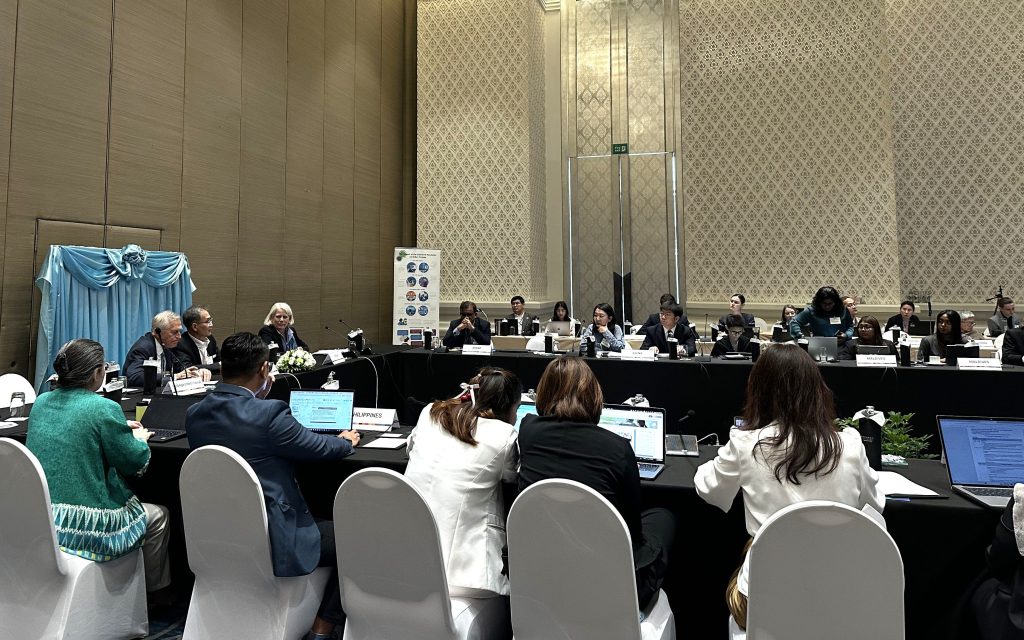
BANGKOK, 27 June 2025 – As the global population ages, Asia and the Pacific stand at the forefront of this demographic megatrend, with 60% of all older persons worldwide residing in the region. This significant shift presents both profound challenges and unique opportunities, necessitating forward-looking policies and the mainstreaming of ageing into all development plans and programs.
Experts gathered in the meeting on population and development, discussing recent and future trends in population ageing across Asia and the Pacific, highlighting their priority implications. Mr. Srivinas Tata, ESCAP Director of Social Development Division, shared during his welcome remarks that a crucial aspect of the meeting involves reviewing a draft survey, expected for launch in early 2026, which aims to assess the implementation of the Madrid International Plan of Action on Ageing (MIPAA) among ESCAP member States. Additionally, participants will receive updates on the ESCAP repository of policies on ageing and its database of good practices, platforms designed to showcase forthcoming survey results.
Dr. Somsak Akksilp, ACAI Executive Director, moderated session 1 on the current trends of population ageing in Asia and the Pacific. In this session, Ms. Sabine Henning, ESCAP Chief of the Sustainable Demographic Transition Section, presented the demographic trends, implications and policies, while Mr. Eduardo Klien, HelpAge International Regional Representative, shared the ten areas of innovation, ranging from reframing ageing to data and evidence.
Session 2 featured insightful presentations on policy priorities concerning ageing from countries including Bangladesh, China, the Maldives, and Lao PDR. Discussions extended beyond national contexts, with participants emphasising the importance of addressing ageing from a gender perspective and integrating older persons’ initiatives into the ASEAN 2045 Our Shared Future framework, particularly within its economic pillar.

Day 2 continued with further country presentations from Malaysia, Pakistan, Viet Nam, Azerbaijan, Fiji, and the Philippines, which shared their policy priorities on ageing. Session 3 focused on the crucial plans for the Fifth Review and Appraisal of the MIPAA in Asia and the Pacific, including a detailed review of the MIPAA survey. The afternoon activities involved parallel working groups exploring various aspects of MIPAA implementation, including national policy, older persons and development, health and well-being, enabling environments, data and monitoring, and intergenerational policies. The ACAI team was involved in working groups for Plans for the Fifth Review and Appraisal of MIPAA in Asia and the Pacific, including the MIPAA survey review. The day concluded with Session 4, which provided updates and future plans for the ESCAP repository of policies on ageing and the database of good practices.
Furthermore, participants will have the valuable opportunity to visit a community centre for older persons on the outskirts of Bangkok to gain firsthand insights into community-based care in Thailand. Concluding the meeting, ACAI had the chance to present the ACAI Strategic Plan in support of the Fifth Review and Appraisal of MIPAA in Asia and the Pacific during the panel with AARP, ESCAP, OHCHR, UNFPA, WHO, HelpAge International, and Tsao Foundation.
ACAI remains steadfast in its commitment to promoting active ageing and looks forward to contributing to these vital discussions. By fostering enhanced cooperation and developing partnerships, we aim to collectively address the challenges and seize the opportunities presented by population ageing throughout the region.
###
